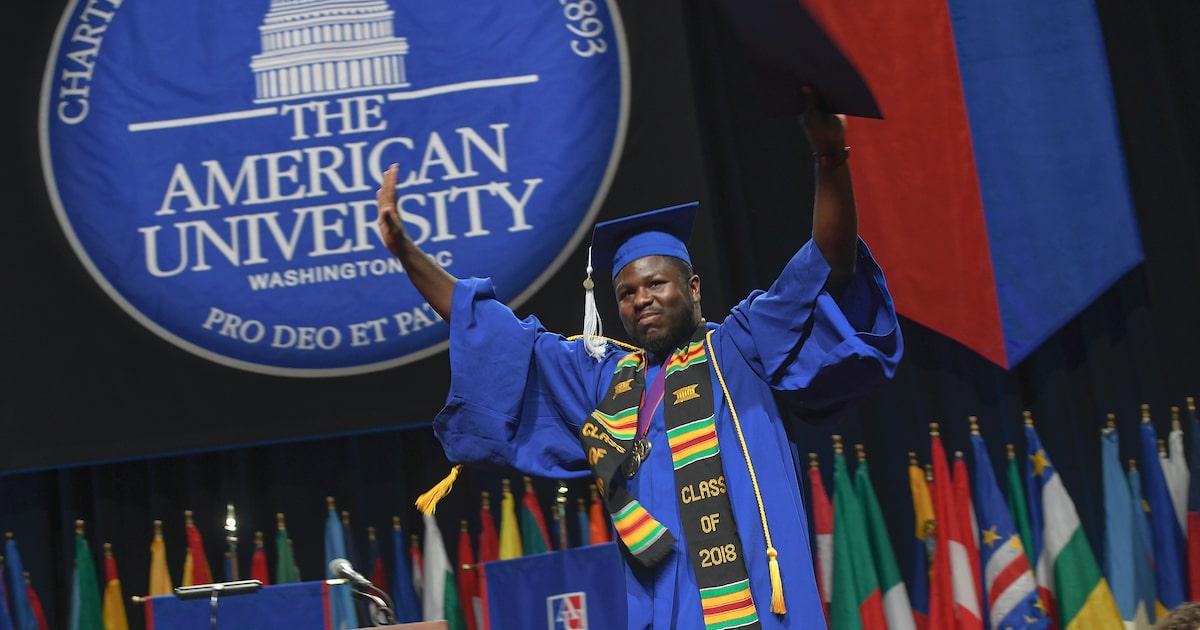
The School of Public Affairs’ (SPA) Helfat Faculty Development Fund, generously created by Jonathan, SPA/BA ’68, and Robin Helfat, helped make the Washington Summit on the 25th Anniversary of the Good Friday/Belfast Agreement one of the most prominent commemorations in the US.
On a clear March day, government leaders, scholars, and students gathered together in American University’s Constitution Hall to consider the 25th Anniversary of the Good Friday/Belfast Agreement, which established a path to peace in Northern Ireland in 1998.
Hosted by AU through a grant from the Helfat Faculty Development Fund, the day-long Summit was among the most significant commemorations taking place this year in the United States. It affirmed the vibrancy of SPA’s partnerships and was a collaboration between AU, Georgetown University, Ulster University, the Northern Ireland Bureau, and the Washington Ireland Program, as well as the Irish and UK governments.
Over the course of keynote speeches and four themed panels, the Summit brought together high-profile individuals from academic and political sectors. The goal was to foster thoughtful discussions about the Good Friday/Belfast Agreement—its tumultuous history, the integral role of the United States, and the optimistic future of Northern Ireland.
Fostering Critical Conversations
The Summit held pointed relevancy amidst unfolding political events in the UK and the US.
Signed on April 10, 1998, the Good Friday/Belfast Agreement ended the 30-year sectarian conflict known as the Troubles. It set up a power-sharing arrangement between Northern Ireland and the UK and created a new parliament, the Northern Ireland Assembly. The agreement gave the assembly authority over certain areas such as health and education, while also outlining steps for disarmament and prisoner release.
The Good Friday/Belfast Agreement was a product of rigorous negotiations between Nationalist and Unionist parties, mediated by the United States and spearheaded by President Bill Clinton and Senator George Mitchell (D-ME).
Now 25 years on, the Good Friday/Belfast Agreement continues to have profound implications for the region. The frequent suspensions of the Northern Ireland Assembly and the challenges of Brexit, in particular, have thrust a new spotlight on the agreement.
The Summit’s organizers centered this sense of relevancy in their programing. In welcoming remarks, speakers punctuated the unique value of a DC meeting space for critical conversations. Andrew Elliott, Director of the Northern Ireland Bureau, North America, highlighted the “really perfect” timing against the changing political backdrop. From Ulster University, Vice-Chancellor Paul Bartholomew suggested the event provided “an opportunity to take up a particular vantage point” on the anniversary events calendar. Referencing his own personal connection, Sen. Mitchell conveyed his “hope” for the Summit to deepen US relationships with the island of Ireland and the UK.
Keynotes by Ambassador Nancy Soderberg and SPA Dean Vicky Wilkins similarly underscored this theme of forward-looking retrospection, stressing the importance of discussions that reconcile past challenges with future ambitions.
Within the panels themselves, participants examined the enduring complexities of Northern Ireland. Panel 1 kicked off the day with featured faculty including AU’s Carolyn Gallaher (SIS) and Kimberly Cowell-Meyers (SPA) to trace the agreement’s significance for peace and conflict scholars. Panels 2 and 3 delved into diplomatic infrastructure through the perspectives of European ambassadors and US representatives.
The last panel had special pertinence for the current moment. With a diverse group of young leaders from Northern Ireland and a focus on the road ahead, Panel 4 closed the Summit on a note of discerning optimism. The message was clear—regardless of political shifts, communities will continue to advocate for an equitable society and thriving economy that reflect the Northern Ireland of now.
Showcasing Scholarly Excellence
The caliber and rigor of the Washington Summit on the 25th Anniversary of the Good Friday/Belfast Agreement highlighted SPA’s prestige as a changemaking institution and underlined the impact of the Helfat Faculty Development Fund.
“The Summit's success was in large part due to the availability of funding through the Helfat Faculty Development Fund,” says Dean Wilkins. “The Fund supports faculty activities to advance SPA’s visibility, forge partnerships with important organizations, and/or supports a faculty member in sharing their work more broadly with the scholarly and policy communities.”
Through their research, teaching, and event programming, SPA faculty drive essential discussions about pressing political issues. The Helfat Faculty Development Fund supports these dedicated scholar-teachers at a time when their work is most critical.
Wilkins points to the Summit as evidence of this work in action. “The support provided for the Summit allowed our faculty to create a one-of-a-kind conversation exploring both the history of the Good Friday Agreement and the bright future of Northern Ireland.”
The Helfat Faculty Development Fund is part of AU’s Change Can’t Wait Campaign. To learn more about and support the campaign, visit the Change Can’t Wait web page.




